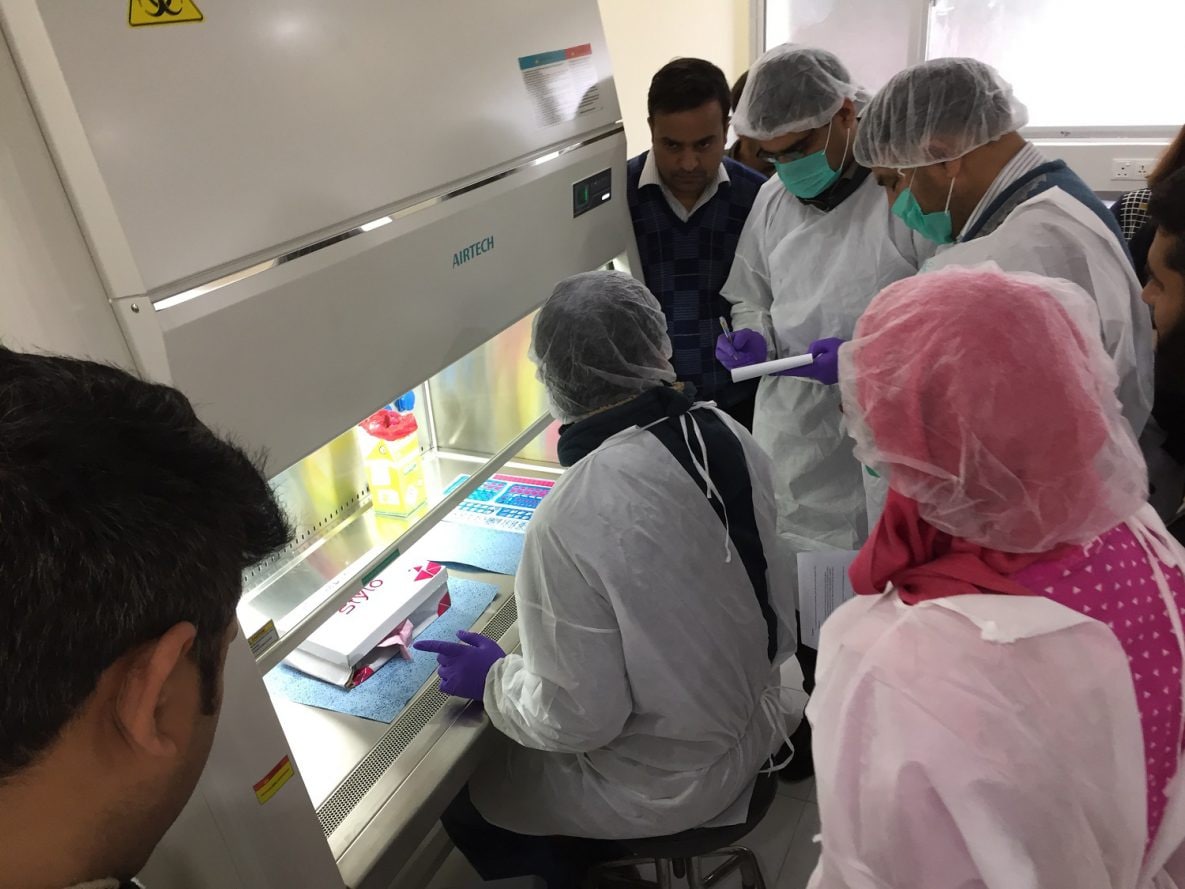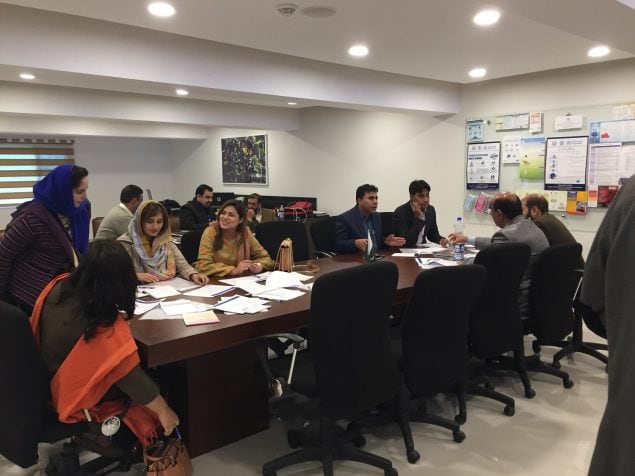Empowering Leaders to Strengthen Laboratory Capacity in Pakistan and Worldwide
August 18, 2021
It is important to have sustainable national laboratory systems and well-trained laboratory leaders to safely, accurately, and quickly identify and respond to public health emergencies. Laboratories — and the people trained to use them — are essential to ensure national and global health security. The ongoing COVID-19 pandemic, which has taken a tremendous toll on every country’s public health system, has further underscored the need for effective laboratory systems and people to lead them.
Recognizing the need for enhanced leadership training for laboratory professionals, particularly in low- and middle-income countries, CDC and global partners have been working together to fill the gap and establish the Global Laboratory Leadership Programme (GLLP). GLLP is rooted in the Laboratory Leadership Competency Framework, which outlines the essential skills for laboratory leaders. As a founding GLLP partner, CDC works to equip emerging leaders from human, animal, and environmental health sectors across the globe with the tools and skills necessary to support laboratory systems and build a country’s capacity to respond to future outbreaks, using a One Health approach to recognize the relationship between human, animal, and environmental health.
Pakistan’s Three-Phased Approach
As part of its regional and national laboratory capacity building strategy to prepare for and respond to public health emergencies, Pakistan looked for opportunities to further develop its laboratory leadership and management capabilities. Pakistan was selected by GLLP partners as the candidate for the first in-country pilot of the program, designed to further develop the Learning Packageexternal icon through feedback gained in a real-world setting.
Conducting the program in-country provided an opportunity for CDC experts and GLLP partners to review materials and integrate the cultural context to ensure effective and culturally relevant instruction.

GLLP participants in Pakistan gain hands-on experience (January 2019). Photo: Amanda Balish, CDC
“GLLP in Pakistan was conducted in a three-phased approach based on the recommendation of the human and animal laboratory leadership sectors, starting with their immediate needs,” said Amanda Balish, MPH, Microbiologist, from CDC’s Division of Global Health Protection (DGHP).
Phase I: Communication and Leadership
The first phase of the pilot was held in-person at the National Institute of Health (NIH) in Islamabad, Pakistan from September to October 2019, and focused on communication and leadership competencies.
The overall structure of the program considered the needs of the Pakistani audience, and modifications were made following suggestions from participants to adapt the instructional design to address the cultural context of the country. These included presenting exercises in Urdu, structuring lessons around prayer times, and tailoring exercises for Pakistan’s laboratory setting.
Phase II: Forging Ahead Amidst COVID-19
The onset of the COVID-19 pandemic required participants to pivot from in-person to remote instruction. From June to August 2020, the second phase of the Pakistan pilot was held using virtual meetings to host instruction on competencies in management, quality management systems, and research. Learning sessions were a combination of recorded classes, live Zoom group discussions, and a variety of remote assignments through online platforms requiring flexibility from both GLLP organizers, mentors and participants.
Continuing the pilot during the COVID-19 pandemic presented limitations, but also resulted in a number lessons learned and recommendations that will benefit GLLP and its participants moving forward. For example, input on the length of sessions and platforms used were integrated during Phase II. Also, engaging in the program during the COVID-19 pandemic was timely and reinforced the value of the program’s flexibility and adaptability, adding to participants’ learning experience. “The learning from GLLP greatly helped me to deal efficiently with this unprecedented situation. Most importantly, I felt confident, ready to lead my staff, and was able to keep them motivated during the outbreak,” said Dr. Massab Umair, Senior Scientific Officer, Pakistan NIH.

GLLP participants in Pakistan work collaboratively on laboratory leadership exercises in January 2019. Photo: Amanda Balish, CDC
Phase III: The Final Stage
The final stage of the pilot in Pakistan began in April 2021 and is scheduled to be completed in September 2021. All sessions are being conducted virtually and will cover the last four competencies:
- Laboratory systems
- Biosafety and biosecurity
- Disease surveillance and outbreak investigations
- Emergency preparedness, response, and recovery
Moving Forward
Piloting GLLP in Pakistan provided an opportunity to build understanding of the need for collaboration across all health laboratory sectors, train eight laboratory leaders, and review the materials, structure, and timeline of GLLP. Also, hosting the in-country program underscored GLLP’s flexibility to adapt to a country’s cultural context. CDC’s guidance and expertise continues to contribute to the expansion of GLLP, empowering laboratory leaders through virtual or in-person training and providing recommendations through analysis of lessons learned. The results of the Pakistan pilot will better prepare laboratory leaders across the globe to respond to future disease threats effectively and efficiently. It will also assist CDC and other GLLP partners achieve their mission of providing tools to develop laboratory leadership competencies, advance national laboratory systems, and improve global health security using a One Health approach.
Following the devastating impact of the 2014-2016 Ebola outbreak, Liberia’s Ministry of Health recognized the need to strengthen its laboratory capacity and welcomed the opportunity to pilot GLLP.
The GLLP pilot in Liberia provided an opportunity to showcase GLLP’s usability in different settings. “Implementation of GLLP in low resource countries shows other countries that they can use it as well,” said Amanda Balish, MPH, Microbiologist from CDC’s Division of Global Health Protection. Eight participants, from both animal and human health laboratories, have had the opportunity to complete workshops in the GLLP’s core competencies for laboratory leaders.
GLLP in Liberia hosted trainings in March 2020 to fit the country’s needs following the outbreak of COVID-19. Learning sessions focused on various aspects of outbreak response, including laboratory risk assessment and management, point of care testing, biosafety levels, and personal protective equipment (PPE). The overall goal was to provide participants a more comprehensive understanding and skills in laboratory safety in the context of COVID-19. While the COVID-19 pandemic was an unforeseen challenge for the GLLP pilot in Liberia, it highlighted the program’s ability to adapt, training laboratory leaders in the skills most needed to drive outbreak response.